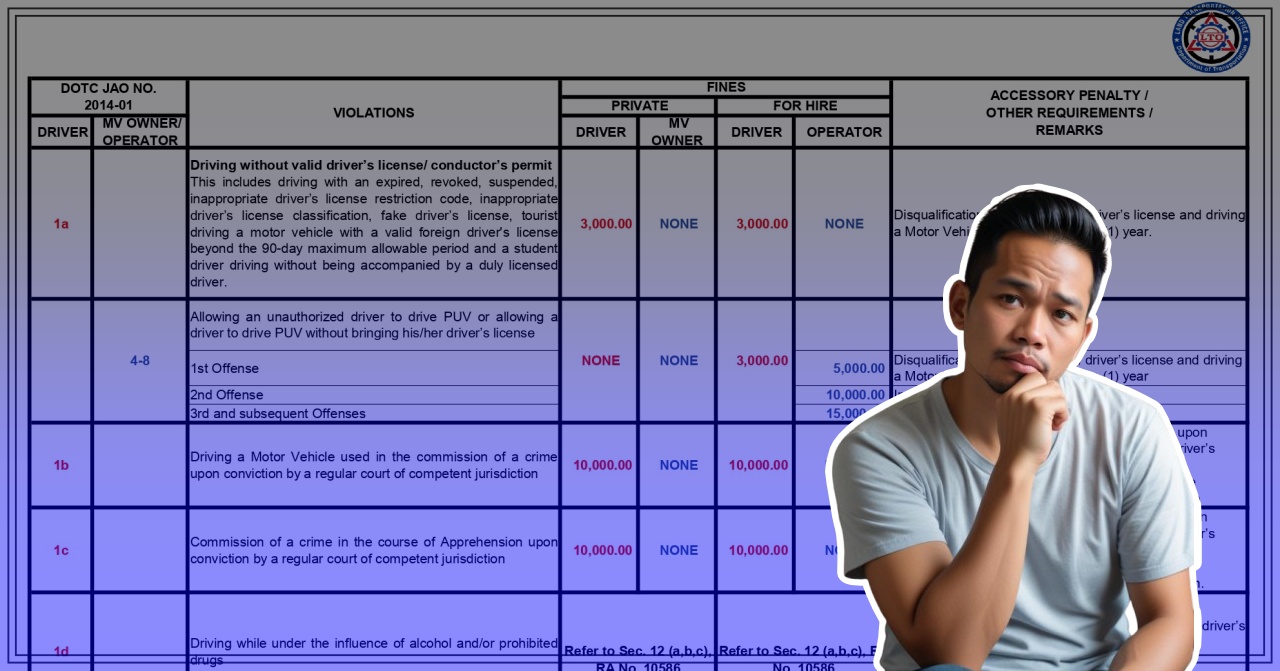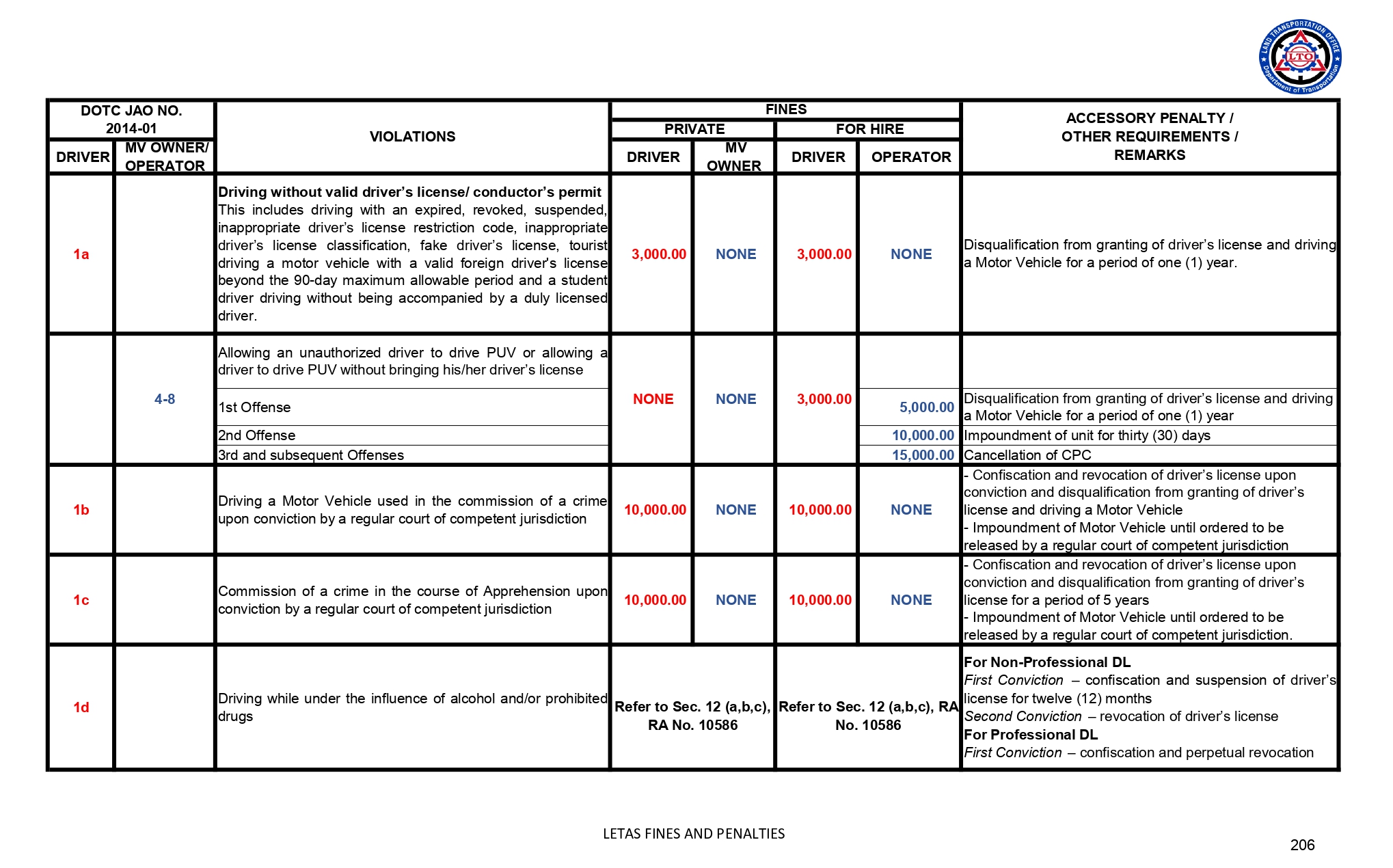The Land Transportation Office (LTO) violations and fines are part of a system designed to guide you toward safer and more responsible driving.
This system focuses specifically on LTO fines, which are separate from those issued by the Metropolitan Manila Development Authority (MMDA).
Understanding the difference can help you avoid confusion and unnecessary penalties.
Whether you commute daily, recently got your license, or manage multiple vehicles, knowing these rules can save you time, money, and stress.
Picture this: being stopped for a minor oversight like forgetting your vehicle’s registration or facing a more serious issue such as reckless driving.
When you understand the related fines and how to address them, it transforms what could be a stressful situation into something manageable.
This system is designed not to punish, but to promote better awareness and accountability on the road.
While some penalties might feel steep, they serve to encourage safer practices for the benefit of all road users.
Keep in mind, the LTO’s scope covers matters like licensing, registration, and vehicle compliance.
On the other hand, the MMDA handles traffic violations such as improper parking and road obstructions.

Who Needs This Guide?
If you’ve ever wondered about the cost of ignoring traffic signs, driving an unregistered vehicle, or how to dispute a fine, this guide is for you.
It’s also useful if you’re a student driver, a professional driver, or anyone who frequently operates a motor vehicle.
With this knowledge, you’ll not only save money but also avoid the stress of being caught off-guard during traffic stops.
What Are LTO Violations?
LTO violations are offenses against the laws and guidelines that govern drivers, vehicles, and traffic.
These include issues like driving without proper documents, reckless driving, unauthorized vehicle changes, and more.
Penalties vary depending on the type of violation and can include monetary fines, license suspension or revocation, and vehicle impounding.
Whether it’s forgetting to renew your registration or committing a serious offense like driving under the influence, knowing these rules can help you navigate the roads responsibly.
Permits and License-Related Violations
Driving without a valid license is one of the most common infractions.
This includes expired, suspended, or revoked licenses.
Fines start at ₱3,000 and repeat offenders may face a one-year disqualification from applying for a new license.
Driving with a fake license or allowing a student driver to operate without a licensed companion also falls under this category.
First-time offenders may also face vehicle impoundment for serious infractions like driving without authorization for public utility vehicles (PUVs), which can escalate fines to ₱5,000 or more.
Motor Vehicle Registration Violations
Driving an unregistered vehicle not only incurs fines but can also lead to impoundment.
The standard penalty is ₱10,000 for unregistered vehicles.
Unauthorized modifications, like altering vehicle color or specifications, may result in fines of ₱5,000, with the vehicle impounded until corrections are made.
Driving Under the Influence (DUI)
Driving under the influence of alcohol or drugs is a serious offense.
First-time offenders face fines of ₱10,000, license suspension for non-professional drivers, and possible vehicle impoundment.
Professional drivers face harsher penalties, including permanent revocation of their licenses on the first offense.
Reckless Driving
Reckless driving includes behaviors like speeding, cutting off other vehicles, and disregarding traffic signs.
Fines range from ₱2,000 for a first offense to ₱10,000 for repeated violations.
Additional violations, such as reckless driving combined with driving an unregistered vehicle, incur compounded penalties.
Seatbelt and Helmet Violations
Failing to wear a seatbelt or ensuring passengers wear one can result in fines starting at ₱1,000.
Motorcyclists who neglect to wear standard protective helmets face penalties ranging from ₱1,500 to ₱10,000 for repeat offenses.
Allowing children under six years old to sit in the front seat is another common infraction, with escalating penalties for repeat offenses.
Overloading and Unsafe Modifications
Overloading your vehicle or operating one with unauthorized modifications is not just illegal but dangerous.
Fines for axle overloading can reach 25% of the vehicle’s Motor Vehicle User’s Charge (MVUC).
Violations in Connection with Franchises
Public utility vehicle (PUV) operators face steep fines for franchise violations.
Operating without a valid Certificate of Public Convenience (CPC) or outside approved routes can result in fines up to ₱1,000,000 for buses.
Repeated violations may result in the cancellation of the CPC and blacklisting of the operator.
Smoke Belching and Emission Standards
Vehicles that fail to meet emission standards contribute to pollution and face penalties.
Fines start at ₱2,000 and escalate for repeat offenses.
Vehicles may also be impounded until they pass emission tests.
[PDF] LTO List of Violations and Fines

This document is an important resource for individuals seeking to address concerns related to traffic fines and penalties under the guidelines provided by the Land Transportation Office (LTO). It serves as a standardized application for compliance and resolution. Users can download the form directly from the LTO’s official website at lto.gov.ph or access it via this link.
Frequently Asked Questions
- What should I do if I receive a traffic violation ticket?
Stay calm and comply with the enforcer.
Verify the violation and understand the penalties before proceeding with payment or disputing the ticket.
- How can I dispute a violation?
File an appeal at the nearest LTO office with supporting evidence, such as photos or witness statements.
- Can I pay my fines online?
Yes, online payment options are available through LTO-accredited platforms.
- What happens if I fail to pay my fine?
Unpaid fines can lead to additional penalties, license suspension, or vehicle impoundment.
- Are there legal assistance services for traffic violations?
Yes, consult with lawyers specializing in traffic laws or seek free legal aid from organizations.
Recent Updates
Addressing Metro Manila’s Road Safety Crisis
The recent Katipunan Flyover accident exposed serious flaws in Metro Manila’s road safety measures.
A truck with faulty brakes caused a tragic crash, resulting in multiple fatalities and injuries.
While the driver is held accountable, the incident reveals larger issues of negligence among vehicle owners and regulatory bodies.
To combat this crisis, the article suggests reforms, community involvement, and stricter vehicle inspections.
These actions aim to create safer roads and prevent future tragedies in the bustling metropolis. (The Inquirer)
Stricter RFID Compliance Rules Begin August 31, 2024
Starting August 31, 2024, motorists passing through expressways without valid RFID devices or sufficient load balances will face penalties under Joint Memorandum Circular No. 2024-001.
The circular imposes fines of up to ₱5,000 for repeat offenders, aiming to reduce traffic congestion caused by non-compliance.
Authorities highlighted that 9% of expressway users fail to meet RFID requirements, causing delays for the compliant majority.
The new measures are designed to improve traffic flow, save resources, and minimize inconvenience at toll plazas.
Further advisories will outline responsibilities for operators, providers, and motorists as well as additional details of the new rules. (GMA News Online)
LTO Warns Public Against Scam Messages
The Land Transportation Office (LTO) has clarified it does not send traffic violation notices via text or messaging apps.
Scammers are reportedly using fake messages with links to bogus LTO sites to steal bank and e-wallet information.
LTO Assistant Secretary Vigor Mendoza II urged the public to ignore these fraudulent schemes to safeguard their personal funds.
The agency is working with the Philippine National Police and the Department of Information and Communications Technology to track down the perpetrators.
LTO regional offices have also been instructed to use their social media channels to spread awareness about this scam. (The Inquirer)
Final Thoughts
Understanding LTO violations and fines is crucial for every driver.
By staying informed, you not only avoid penalties but also contribute to safer roads for everyone.
Remember, a small effort to comply with traffic laws goes a long way in ensuring your safety and that of others.
Use this guide as your road companion to navigate driving responsibly and confidently.